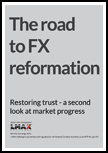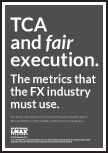While FX as an asset class might be straight forward, customers that play in the FX market have different needs and requirements.
For those corporations and traditional asset managers that view FX transactions as a byproduct of their core business (e.g., cross-border transactions), for example, overall costs associated with execution might be less of an issue; these customer segments would also view access to large size as important, leading them to trade on RFQ-based MDPs and SDPs. On the other hand, statistical arbitrage and actively trading hedge funds and HFT firms might care more about cost of execution since they deal with smaller-sized but more frequent transactions, leading them to use ECN/MTF-type execution venues.

A few of the key decision criteria for choosing a trading venue include the following:
- Execution costs: Execution costs are always an important factor in terms of venue selection. Initially, only explicit execution costs were considered but as firms apply sophisticated analytics to venue evaluation, implicit costs (e.g., fill rates, available size, and estimated slippage) have also emerged as important cost variables. Typically, actively trading clients such as HFT firms, hedge funds/CTAs, and retail brokers consider execution costs quite high on their vendor evaluation process.
- Need for size: At times, clients are looking to do a large size trade very quickly and discreetly and are willing to pay a bit more to get that trade done. The ability to support large size is one of the competitive advantages of SDPs. RFQs are also leveraged by MDPs to move large size. The ability to support large orders is very important for corporates, asset managers, and regional banks.
- Need for speed: As the FX market continues to fragment and demand for transparency increases, the need for speed has also grown among the actively trading client segments such as HFTs, hedge funds, and CTAs.
- Need for post-trade support: For certain FX clients that traditionally view FX transactions as more of byproduct of their core business (e.g., corporations that are involved in cross-border trade or asset managers actively investing and trading in foreign markets), post-trade support is one of the essential factors in venue evaluation.
Source: Aite Group ‘Global FX Market Update 2013: Increased Market Transparency, More Competition’, June 2013
Video Transcript
4 key fundamentals to consider when choosing an FX venue
Scott Moffat: So, how do customers choose an FX venue? As we all know, there are plenty of FX venues out in the marketplace, there have been a lot of new entrants into the marketplace. What drives a customer to choose a particular FX venue? FX is quite a simple asset class, you buy dollars and you sell euros, however, the way it’s traded can be very complex at times and there are probably 4 key fundamentals that customers need to consider, and in no particular order; there’s speed do I need to access the market quickly do I need to get in and out of my trades quickly, is speed important to me, do I need a low-latency API for automated trading, if these are key things then that needs to be considered by the customer. The second is liquidity – am I looking for choice of liquidity do I need an aggregated liquidity pool and how much depth do I need, what type of trading do I do, do I trade in 1 million clips or 50 million clips, that trading behaviour needs to be considered. Thirdly, execution costs, there is the obvious execution costs, and what your venue charges you but there is also the hidden cost, what was the spread of the trade, what was my order-fill ratio, did I receive any slippage, there is the execution cost of trading as a whole that needs to be considered. And then finally, there is the post-trade support that you get, do I need my tickets STP’d into my middle-office, do I need the trades allocated to loads of sub-accounts. These four things need to be considered when choosing an FX venue. If you look at the client, if I take a bucket of clients let’s say high-frequency funds, hedge funds and CTAs, what are they looking for, they’re looking to get in and out of the market very quickly, speed is very important to them, API automated trading. Execution costs, because they’re in and out of the market so quickly they’re going to be trading high frequency therefore their execution costs and cost of trades need to be really low. This is fundamental for them, the speed and the execution cost will drive these types of customers towards your ECNs and MTFs out there like LMAX Exchange. Likewise a retail broker, what will a retail broker be looking for? Well a retail broker is going to trade a lot of times during the day, so execution costs are going to be very important, high-fill ratios and spread, so again this type of customer is going to be driven to your ECNs out there and your MTFs out there. And then you have probably another bucket of clients, trading FX might not be their core business, so a corporate treasury department who might be looking to do cross-border transaction, they’re looking to trade FX but looking probably to trade in size, low frequency , big size, likewise some of your old historical asset managers looking to hedge FX risk which they’ve traded in other asset classes, low frequency large trades, the liquidity for them needs to have depth and that will probably push them more towards single-dealer platforms, client-to-bank, your RFQ’s or multi-dealer platforms. To summarise, it sounds quite straight-forward but the customer needs to understand their trading methodology and match the venue which matches their trading methodology perfectly when choosing the venue.





